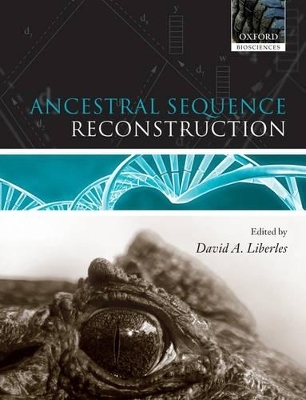
Ancestral Sequence Reconstruction
Oxford University Press (Verlag)
978-0-19-929918-8 (ISBN)
Ancestral sequence reconstruction is a technique of growing importance in molecular evolutionary biology and comparative genomics. As a powerful tool for testing evolutionary and ecological hypotheses, as well as uncovering the link between sequence and molecular phenotype, there are potential applications in a range of fields.
Ancestral Sequence Reconstruction starts with a historical overview of the field, before discussing the potential applications in drug discovery and the pharmaceutical industry. This is followed by a section on computational methodology, which provides a detailed discussion of the available methods for reconstructing ancestral sequences (including their advantages, disadvantages, and potential pitfalls). Purely computational applications of the technique are then covered, including whole proteome reconstruction. Further chapters provide a detailed discussion on taking computationally reconstructed sequences and synthesizing them in the laboratory. The book concludes with a description of the scientific questions where experimental ancestral sequence reconstruction has been utilized to provide insights and inform future research.
This research level text provides a first synthesis of the theories, methodologies and applications associated with ancestral sequence recognition, while simultaneously addressing many of the hot topics in the field. It will be of interest and use to both graduate students and researchers in the fields of molecular biology, molecular evolution, and evolutionary bioinformatics.
David A. Liberles is Assistant Professor at the Department of Molecular Biology, University of Wyoming, USA
1. The Early Days of Paleogenomics, Connecting Molecules to the Planet ; 2. Ancestral Sequence Reconstruction as a Tool to Understand Natural History and Guide Synthetic Biology: Realizing and Extending the Vision of Zuckerkandl and Pauling ; 3. Linking Sequence to Function in Drug Design with Ancestral Sequence Reconstruction ; 4. Probabilistic Models and Their Impact on the Accuracy of Reconstructed Ancestral Sequences ; 5. Probabilistic Ancestral Sequences Based on the Markovian Model of Evolution- Algorithms and Applications ; 6. Estimating the History of Mutations on a Phylogeny ; 7. Coarse Projections of the Protein-Mutational Fitness Landscape ; 8. Dealing with Uncertainty in Ancestral Sequence Reconstruction: Sampling from the Posterior Distribution ; 9. Evolutionary Properties of Sequences and Ancestral State Reconstruction ; 10. Reconstructing the Ancestral Eukaryote- Lessons from the Past ; 11. Using Ancestral Sequence Inference to Determine the Trend of Functional Divergence After Gene Duplication ; 12. Reconstruction of Ancestral Proteomes ; 13. Computational Reconstruction of Ancestral Genomic Regions from Evolutionarily Conserved Gene Clusters ; 14. Experimental Resurrection of Ancient Biomolecules: Gene Synthesis, Heterologous Protein Expression, and Functional Assays ; 15. Dealing with Model Uncertainty in Reconstructing Ancestral Proteins in the Laboratory: Examples from Ancestral Visual Pigments and GFP-like Proteins ; 16. Unraveling the Evolution of Complexity by Resurrecting Ancient Genes ; 17. A Thermophilic Last Universal Ancestor Inferred from its Estimated Amino Acid Composition ; 18. The Resurrection of Ribonucleases from Mammals. From Ecology to Medicine ; 19. Evolution of Specificity and Diversity
| Erscheint lt. Verlag | 31.5.2007 |
|---|---|
| Zusatzinfo | numerous line figures/tables |
| Verlagsort | Oxford |
| Sprache | englisch |
| Maße | 194 x 252 mm |
| Gewicht | 760 g |
| Themenwelt | Naturwissenschaften ► Biologie ► Evolution |
| Naturwissenschaften ► Biologie ► Genetik / Molekularbiologie | |
| ISBN-10 | 0-19-929918-8 / 0199299188 |
| ISBN-13 | 978-0-19-929918-8 / 9780199299188 |
| Zustand | Neuware |
| Haben Sie eine Frage zum Produkt? |
aus dem Bereich


